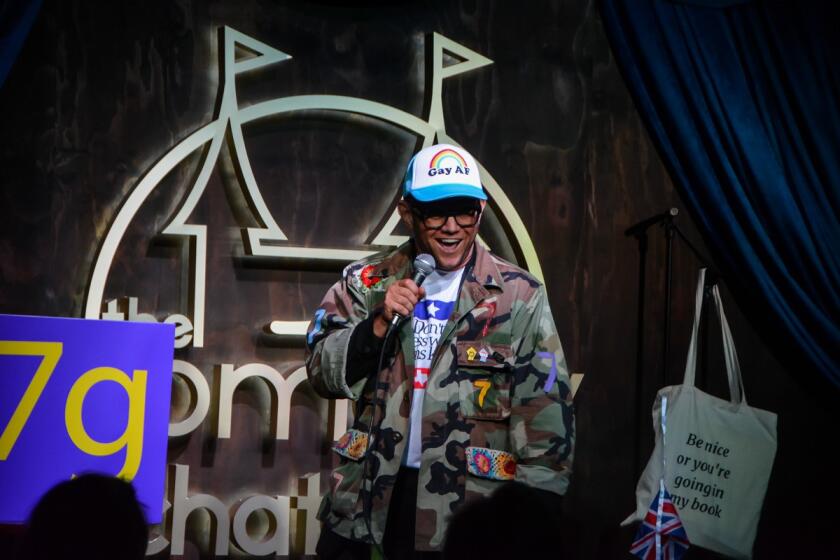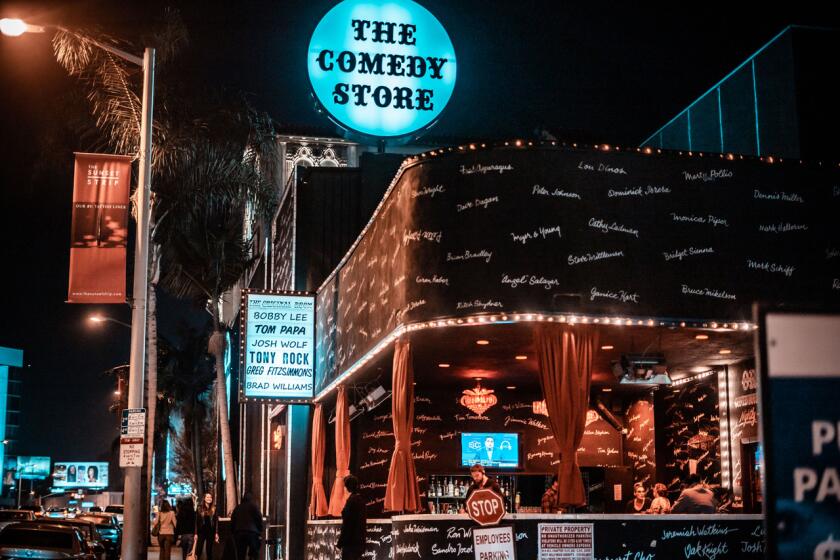Commentary: L.A.-based British creatives need a new queen -- Gina Yashere deserves the throne
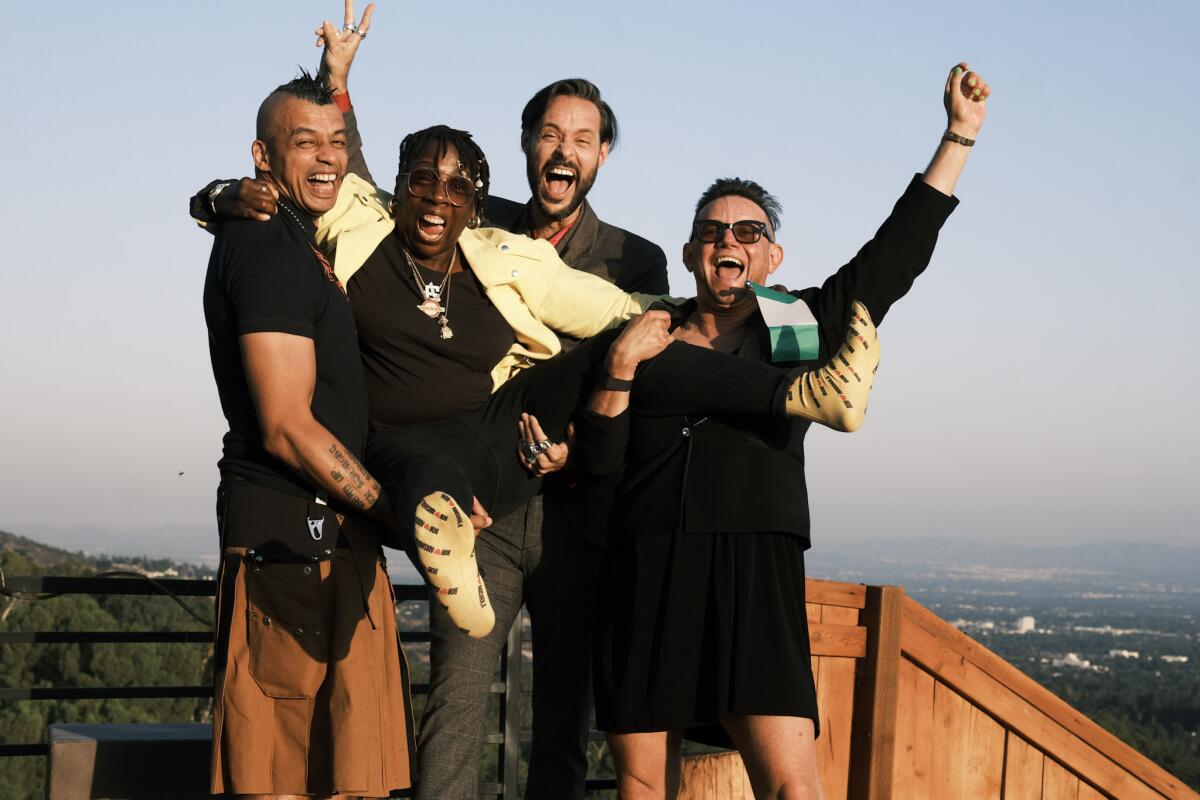
Standing by her pool, overlooking a sunbaked panoramic view of Los Angeles, comedian Gina Yashere is radiant in the golden hour light. These days her life is abundant with showbiz success: a classy crib, bespoke designer jacket, accented by bling-tastic jewelry, and big-rimmed retro ‘80s vibe spectacles. Her look is finished off with bright yellow, “Bob Hearts Abishola” socks. By now it’s getting hard to ignore the hilarious Warner Bros. TV comedy she co-created with America’s Sitcom King, Chuck Lorre. Season 4 launches Monday on CBS.
Born in London to Nigerian parents, Yashere moved to America in 2007, on her own, to compete in NBC’s “Last Comic Standing,” then stayed, making yearly “bank raids” back to the UK comedy scene to earn the cash to keep paying the rent in much less salubrious areas of L.A. than this hilltop heaven she now shares with her partner, Nina Rose Fischer.
Yashere built up a body of work through self-financing her specials, even making regular trips to play small shows in San Francisco and doing her own street marketing to ensure selling out the theater, where she recorded her 2014 special “Laughing to America.” That total dedication to winning is obviously bringing in the big bucks and making her family proud.
On a recent evening, Gina invited a group of fellow Brits over to celebrate and share stories with her. She wants to be with people who really understand what it took — “the sheer amount of hustle, the number of disappointments, being turned down for things, people not knowing what to do with me, being ignored,” and the big sacrifices of leaving the UK (free healthcare!). Those around this table all share that experience of risking it all to succeed here and how far adrift from one’s culture we can feel at times.
While it may look from overseas that the whole UK is grieving the recent loss of Her Majesty, Queen Elizabeth II, for some of us, our relationship with the monarchy is more problematic.
“While I have sympathy for her family and everyone who loved her and am respectful of her passing, at the same time she was the head of an institution which has been responsible for the theft of people, land and natural resources, as well as colonization and the genocide of millions of people around the globe, including the country of my parents’ birth,” Yashere says. “So am I grieving? No. My family are from Benin City, Nigeria. I’m still waiting for the return of our stolen artifacts.”
To live and work in U.S. takes real commitment — just getting the work visa ain’t easy. The Brits who make it to L.A. must have a proven track record in the UK cultural landscape. “I came here thinking I’m a great comic, I’m going to earn a living immediately, just from the comedy — until I get on TV,” Yashere says. “That was not how it turned out.”
Yashere just got back home after a killer week of writing, producing, acting and co-showrunning “Bob Hearts Abishola.” She has literally one hour of downtime to enjoy her company — Jeff Leach, Mark Tonderai and myself, a clan of badass Brits, all fellow comedians and multi-hyphenate creatives who have called L.A. their home for five-plus years.
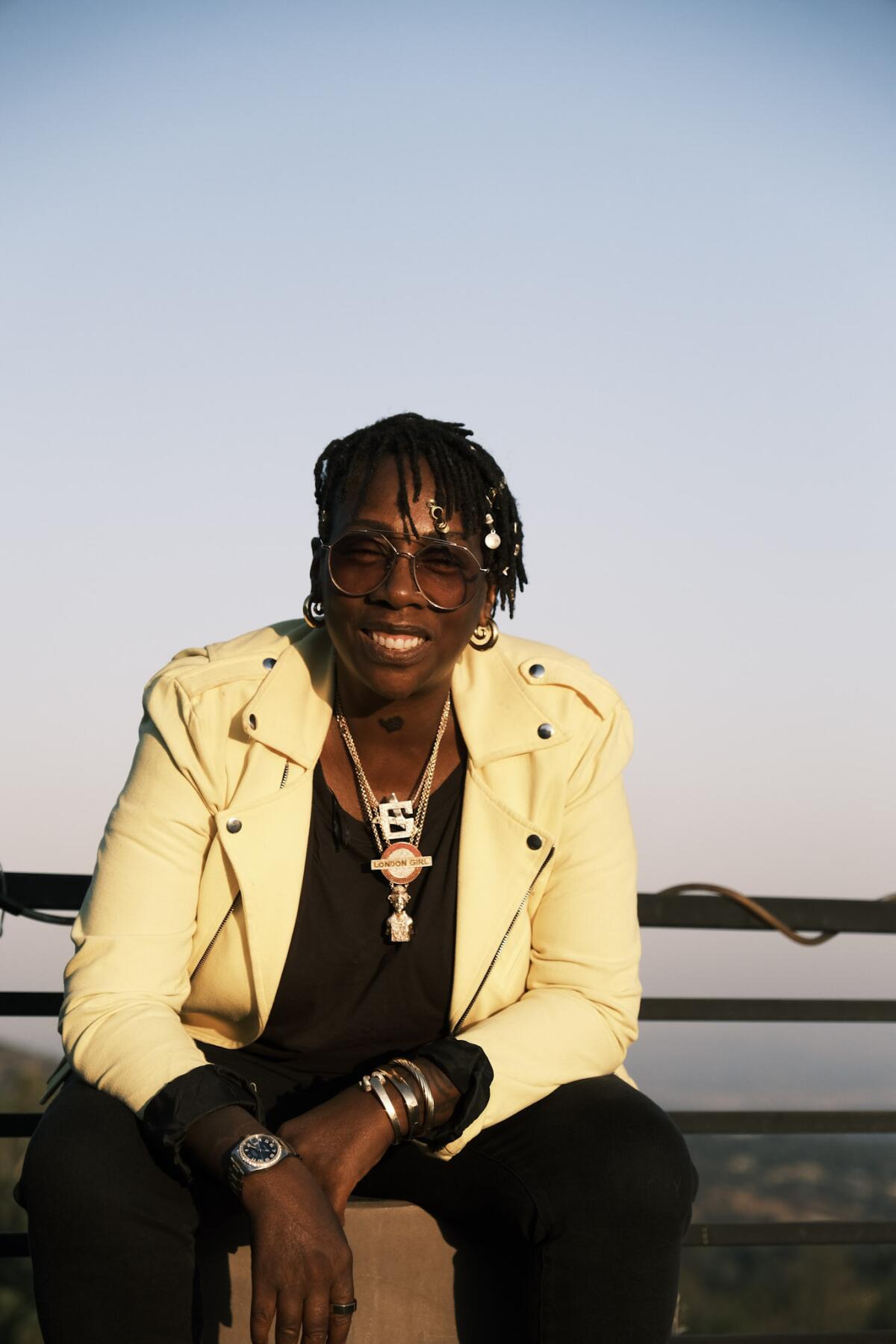
Yashere is a busy lady and as the tea is poured from a beautiful teapot and Scottish Walkers butter shortbread “biscuits” are passed around, she is in her element holding court while keeping one eye on the clock. She’ll be jumping back in her Tesla and racing down the hill(s) to the Laugh Factory for an 8 p.m. show to perform new bits she’s working on.
Sitting across from her on her patio, comedian and popular streamer Jeff Leach looks like the epitome of a suave English gentleman, sporting a pocket watch and a silver skull-topped cane. Like Yeshere, Leach is no stranger to the comedy grind. A regular on the New York comedy scene, he has not one, but three comedy specials coming out in the next six months.
Defying comedy conventions of what constitutes a special, his triple-header includes stand-up from the Comedy Cellar in New York, an animation where he plays five characters, and a dramatic dialogue between himself and his own ego (you guessed it, he plays both roles), which forms the backbone of the piece. Heck, there’s even a rap music video, with lyrics all written and performed by Leach.
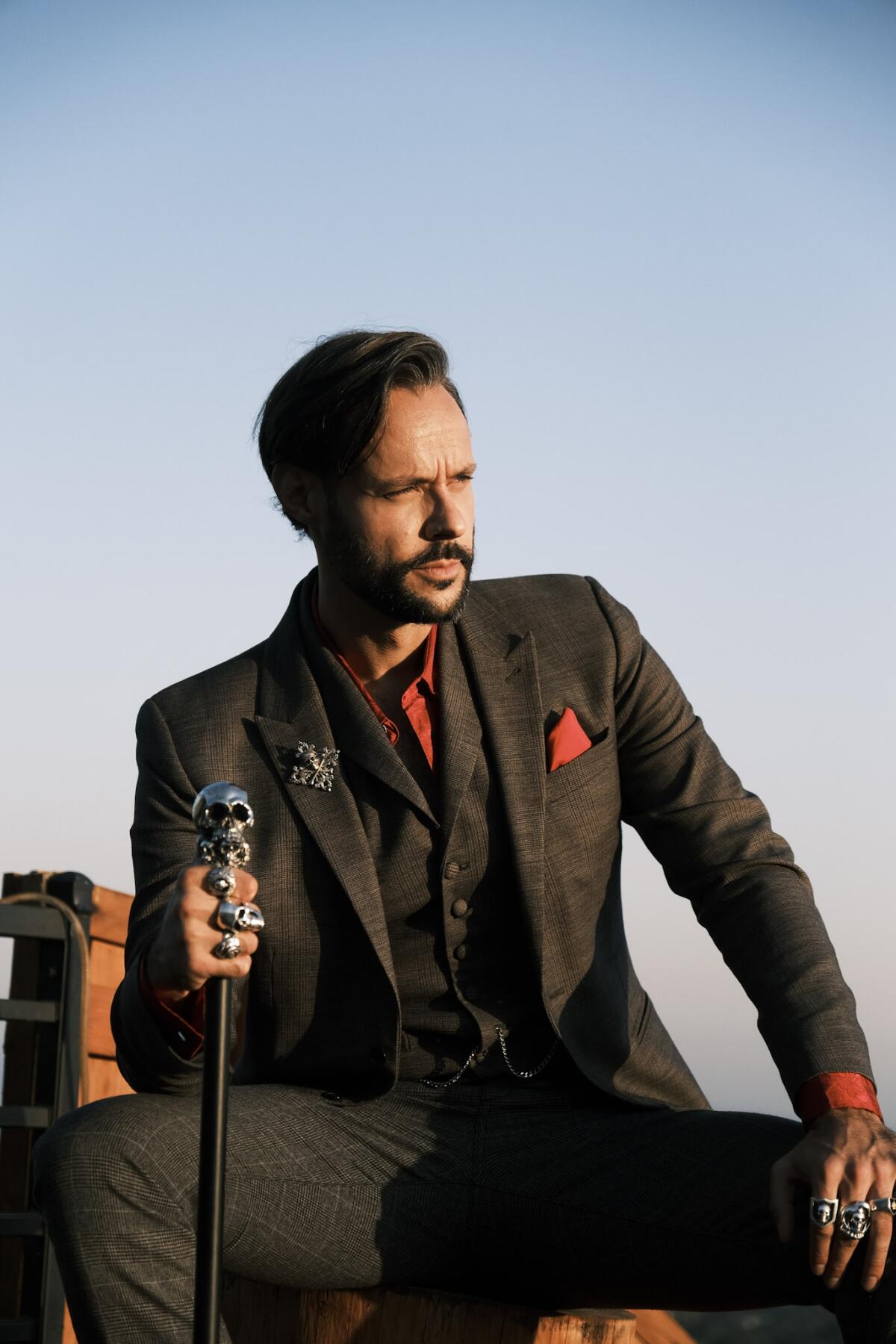
Leach has big ambitions for this trilogy. He raised most of the capital fundraising from his fanbase and is investing in himself too, so he can retain total creative control. Leach says his new material focuses on “love, happiness, potential fatherhood, and fears of getting older. It doesn’t matter what gender you identify as, everyone gets bad knees after 35,” Leach jokes. “I like to talk about concepts that are universal- that bind people together, rather than divide them.”
The UK loves to put talented people in boxes and make us pick just one thing to be good at. None of the Brits around this table could accept that — being put in a box and giving away our power.
Across the table, Mark Tonderai looks like he hot-footed it from the runway at London Fashion Week, or is moonlighting from his world stadium tour — definite rock star vibes. The Mohican-and-kilt-inspired man-skirt combined with sipping from a cup and saucer is not a look many straight cis men can pull off.
It’s so good to see Tonderai post-COVID, for the first time, I cried salty tears (which, in my empirical experience, after transitioning to Out transmasc & non-binary hermaphrodite, is much harder to do on testosterone than on estrogen).
Tonderai is just off the plane from visiting family in South Africa and he and his producer wife Zoe Stewart and their two gorgeous kids are the closest chosen family I have in the U.S. They visited me in the dark days of rehab (2002) and were at both my weddings. When moving here in 2015, it was them who inducted me into the joy of deep-fried Thanksgiving turkey.
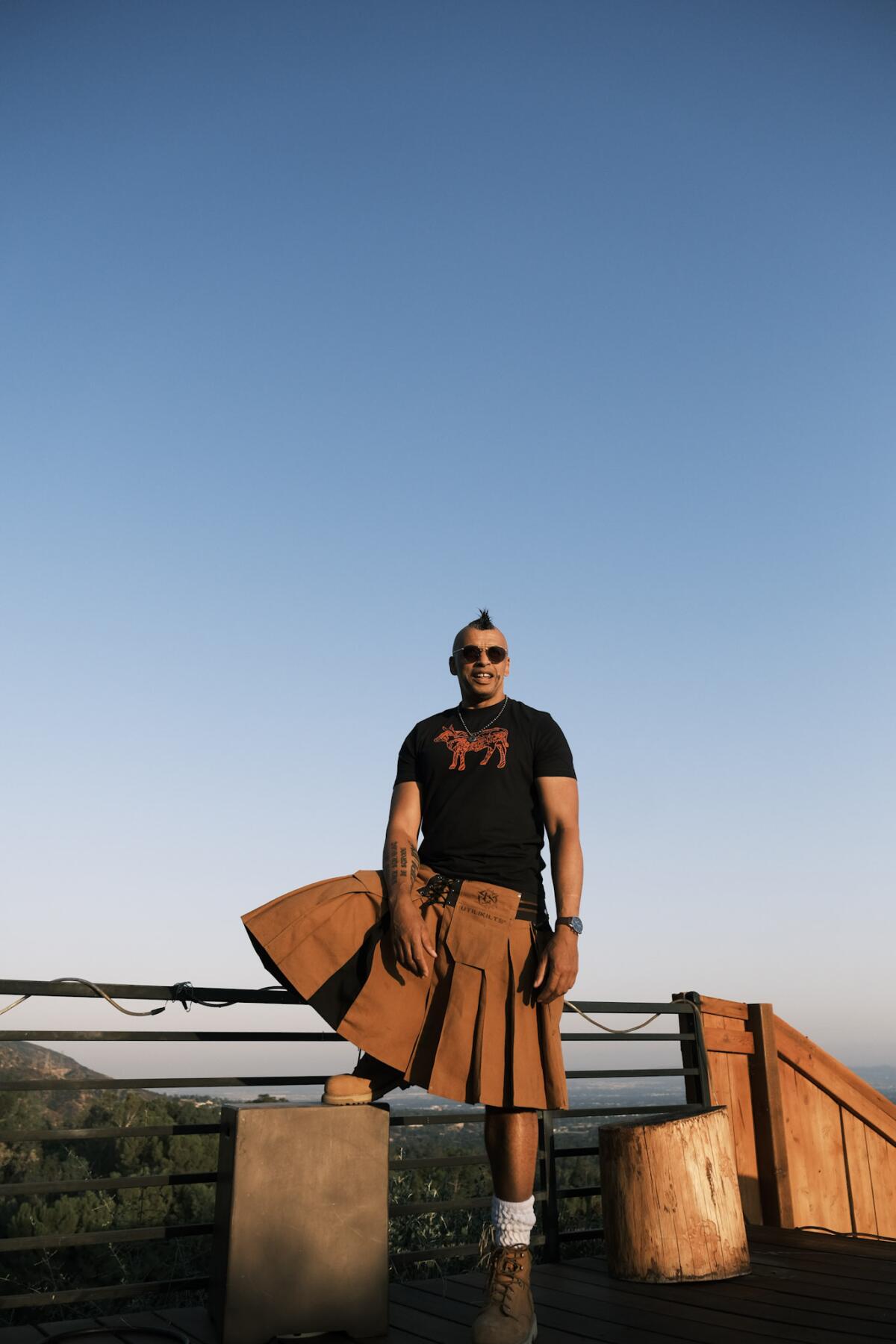
Tonderai and I met at the start of our careers, when we both worked at BBC Radio 1FM, in 1994, and bonded over a left field sense of humor, awareness that we were both Outsiders at the BBC, with dreams much bigger than Broadcasting House and BBC Television Center could satisfy.
Tonderai left “Auntie Beeb” before me to write, act and direct in independent network TV and then feature films. He started his film and TV career on screen, as an actor (see 2001 pet theft comedy “Dog Eat Dog”) but he is very happy these days creating behind the scenes, as a writer-director.
A person of color getting a film made in the UK, that they both wrote and directed, is almost unheard of still in 2022. Tonderai pulled this off brilliantly, with “Hush” (2008), with the help of his wife producing. This terrifying movie was his calling card to Hollywood and he was flown over to meet some of his heroes.
The first movie he made here was another scary one, “House at the End of the Street” (2012), starring Jennifer Lawrence. His latest feature was the 2020 horror film “Spell.”
With 12 years of experience writing and directing in the U.S., what has Tonderai learned? “There are two things you need to make it here, kingmakers — that’s what I call them — the people who anoint you and support your career. And stamina,” he says. “Stamina outweighs talent!”
Yashere and Tonderai knew each other in London back in the day but weren’t aware that they are now nearly neighbors. Hearing them chatting, it’s clear that they both shared the same dream and vision that as Black British creatives they had to come to America to stand a chance of achieving their goals and potential. The UK was too small a pond and too much of a closed shop to break in.
Tonderai notes that he knows at least 20 Black British creatives who have moved to the U.S. because they felt their careers were being stymied in UK. “In England, if you don’t sell to the BBC, where else are you going to go? Maybe Channel 4 but they are really hard to sell to. I always feel in America you are one phone call away from having your life changed.”
The BBC and much of the UK media in the ‘90s up until recent years were horribly white at the management and board level. These days, the changes we are seeing on screen are happening much faster than in the seats of power.
The BBC has been frequently called out for institutional racism and is still failing to take the action needed to change — the current board is still almost all white. In her 2021 autobiography, “Cack-Handed,” Yashere details, very movingly, how she was treated with an absolutely appalling lack of respect by the BBC.
In the wake of George Floyd’s murder and Black Lives Matter gaining some real traction, both Yashere and Tonderai are very grateful to live here and have the successful careers they are enjoying. Tonderai looks emotional as he sums this up, “America has given me everything.”
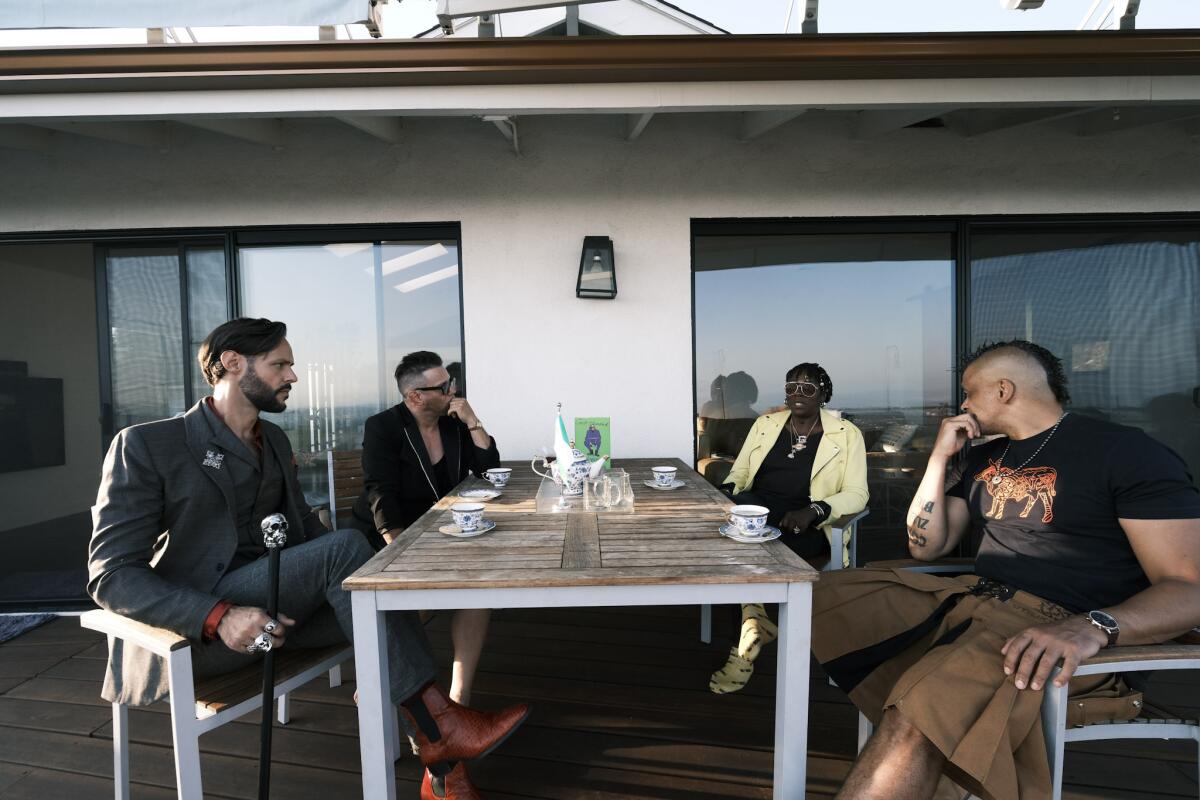
They compare stories of how having a British accent has helped to offset some of the racism that is still present in the U.S. Despite having high-powered allies like Chuck Lorre, they still have to keep insisting on improving diversity on the floor/in their production teams and be assertive to be heard.
“I made sure I sat in on the auditions, so when those actors came in and saw me, they knew they were safe and wouldn’t be asked to do any buffoonery,” Yashere says.
Although things are now heading in the right direction, both agree there is still much entrenched industry racism.
This mixed bag of Brits by Yashere’s pool is a very jolly ensemble, enjoying the organic Earl Grey tea (from Trader Joe’s), and there is a kind of bonhomie that comes from having more than nationality in common. This meeting of creative British talent all made L.A. their home for the long haul.
Many folks come here from Blighty to break into America and give up if it doesn’t happen in a year or two. It can be particularly humbling and difficult to swallow, if you are famous and successful in Europe.
We four are united in both hustle and stamina, which might come from not having been born into the “Downton Abbey”-esque upper-class, white privilege that Hollywood is traditionally more familiar with. You know the type — the scary posh, stuck up Brit Brigade, born with the silver spoon in their mouths. The lily-white patriarchal hierarchy of the British upper class that Meghan has sprung Harry from. We all moved here over five years ago, united in wanting access to greater opportunities and to make it on our own terms and talent; and if that means sleeping in a closet, so be it. I call it my Sex Dungeon and light a Diptyque candle to add classy ambience.
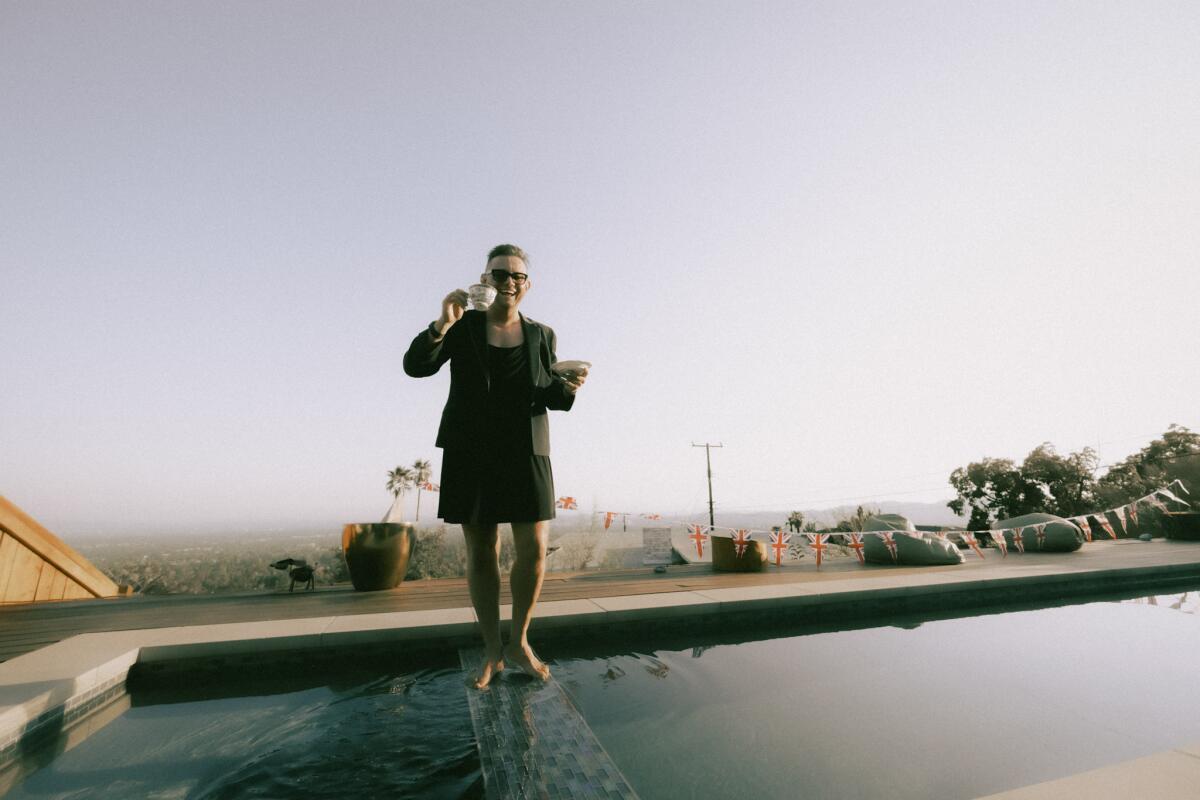
When you move to L.A., finding your community is absolutely vital to surviving the constant rejection, loneliness and realization this is a very long game. Both Leach and I hit emotional/depression rock bottoms in the early days of moving to America and we both now channel our experiences of overcoming these mental health challenges into helping our community.
Leach was most widely known for playing Simon “Ghost” Riley in “Call of Duty” games and he streams daily to a 500K strong audience of global fans. He uses this platform to help others by talking openly about his alcoholism rock bottom and how he survived the shame of nearly being canceled for losing his cool and verbally striking out at a troll who harassed him daily for two months and was telling him to kill himself (after having survived a suicide attempt).
Leach shares openly about his past pain, substance misuse, and all the ways he “f— up” to help those fans who are struggling to find sobriety and acquire the tools they need to hang in there. He is obviously very committed to his own healing process after this brush with Cancel Culture, “I made mistakes ... I didn’t represent myself in ways that I want to ...and over the last three years [since getting sober] I’ve done a lot of work on that — self-control. I see a therapist every week, which is very American!”
It is a difficult time for many Brits currently because of the death of the queen. Our country is in mourning and will be until her funeral on Monday. Leach says, “Whilst I loathe colonialism and the royals’ ties to this dark history, Queen Lizzy always had a smile, a wave, a bright outfit and some words of wisdom for the British people. Big shoes for King Charles III to fill ... Or as I call him, The Monarch formerly known as Prince.”
Seeing Yashere’s comedy success in Hollywood really bolstered my resolve to stay and not go home to the UK after divorcing my L.A. wife, and instead to dig deeper and keep saying yes to stand-up gigs wherever I get invited, no matter how sketchy it might feel to a Brit. Melrose Avenue can feel scary at night. Cycling through downtown after sunset is like visiting Dante’s Inferno. And it does take a lot of courage to not give in to the chronic loneliness, homesickness, anxieties and fears that come with being an immigrant. Especially, when one comes from a sweet, safe country with zero gun massacres in schools, no unhoused encampments or psychotic individuals roaming the streets — and we have free healthcare for all. Those people are in hospital and given proper psychiatric medication — not cannabis and meth.
Watching Yashere’s three comedy specials lifted my spirits and were a sanctuary in the dark days of COVID, being grounded here. Just hearing her London accent feels comforting, like home — we lived close to each other in the East End of London.

Things really started taking off for Yashere in late 2018, when Lorre asked her to be a consultant on “Bob Hearts Abishola,” the show he wanted to create after “Young Sheldon” and the huge global success of “The Big Bang Theory,” “The Kominsky Method” and “Two and a Half Men.” She took a meeting and then told her agent to say, “Thanks but, no thanks.”
Who says no to America’s undisputed Master of Successful Sitcoms? Very few people have Lorre’s stature in the world of TV. Yashere knows her true value and wasn’t willing to be a consultant on her own culture.
Fortunately, her little brother (a huge “Big Bang” fan) and her best friend told her she was “f— up” and about to make a horrible career mistake. They reasoned she couldn’t complain about Hollywood not making shows for people like her if she was willing to look this gift horse in the mouth and just walk away. Yashere listened to this good advice and agreed to spend a day “consulting” with Lorre and his team before politely saying no.
Almost despite herself, she fell into brainstorming the concept of the show — a white rich businessman has a heart attack and falls in love with his Nigerian nurse — and then pitching character ideas, along with giving Lorre’s team a master class on how Hollywood stereotypes Africans.
After this day of hanging out and talking about show ideas, Yashere and Lorre developed a mutual bond. He called her agent that night and said to forget the “consultant offer”: He wanted to co-create and write the show with Yashere, starting straight away. Three weeks later, after washing her underwear each night in the hotel bathroom, they emerged from the writers room with a strong pilot script she was very happy with.
Now four seasons in, Yashere is truly living the dream in Los Angeles, one that so many Brits and creatives from abroad come here for every year and so few actually manifest. “It’s been a f— amazing few years, I feel like I’ve made it,” Yashere says.
For all those of us wanting to emulate this success in Hollywood, as she puts it, “manifesting” her Hollywood dreams, what’s it feel like when it actually happens? Yashere says, “When CBS called me to tell me they were picking up the show, my hands were shaking so much I dropped the phone and cut them off [laughs]. It was truly the best day of my life.”
To celebrate the night with our merry group of Londoners, we end things by declaring a toast — “to Gina!” Unlike many Brits in the wider Brits in L.A. social circle, Leach, Yashere and I don’t drink alcohol — and glancing at Tonderai’s big guns, he is still hitting the gym — so everyone is perfectly happy to raise a teacup to salute Gina and the new season of “Bob Hearts Abishola.”
Then, we lift her up on our shoulders — victorious! And try hard not to drop her whilst Asher, the photographer, gets the shot! (That would be an unhappy ending.)
If hustling and hard graft were an Olympic sport, Yashere would deserve a gold medal. And tonight it feels like she’s our very own — elected on merit — Queen of Hollywood.


